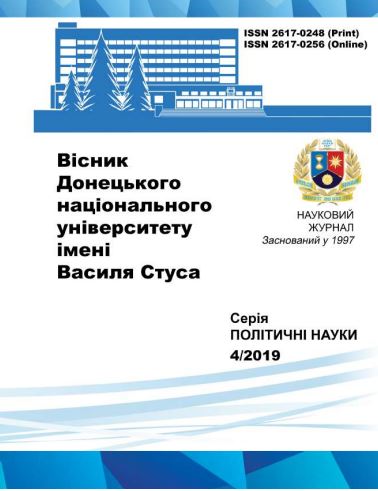The paradigm of political law: doctrinal and praxeological aspects
DOI:
https://doi.org/10.31558/2617-0248.2019.4.1Keywords:
political law, legal political science, state, society, politics, political powerAbstract
The article presents the essential and substantive characteristics of political law as a phenomenon of modern political and legal science. The synergistic relationship between the subject, principles, goals and objectives of political and constitutional law, fundamental institutions of politics and law is shown. It is argued that political law is not only the doctrinal basis of political phenomena and processes, but also one of the important components of the process of achieving political goals, goals and functions of political power, an inherent feature and strategic element of the mechanism of exercising political rights and freedoms.
It is argued that the idea of combining in the subject of political science a system of categories related to the phenomena of political freedom, political power, political responsibility and other political and legal phenomena and processes must find expression in the system, functions, methodologies of political law, etc. The idea behind these and other political and legal categories is the essence of the subject of scientific knowledge about political law. First of all, this is reflected in the content of the objects studied in this field of political knowledge, reflected in the relevant concepts and other theoretical constructs. The idea of political power and political freedom, being a fundamental problem of modern political science, acts as a kind of philosophy and ideology of political law.
It is concluded that in their unity are identified other aspects in the understanding of the essence of political law (including in the context of ideas and values of political science, its substantive and systemic and structural characteristics, including democracy, political freedom, political power, political responsibility, political consciousness, political order, political psychology, political forecasting, political compromise, etc.) allow us to speak about the existence of this phenomenon not only as an attractive conceptual model, but also an objective reality those having axiological, epistemological, ontological, civilization, institutional, constitutive, regulatory, functional and teleological, historical, national and mental parameters that have developed through evolution under the influence of the political ideas and principles, and the real practical political activities.References
Джунь В. В. Соціологія конституційного права: монографія. Київ: Ін Юре, 2015.
Кн. 1: Теоретико-методологічні основи. 384 с.
Кресіна І. Становлення школи правової політології. Право України. 2014. № 5. С. 224–235.
Кресіна І. О. До питання про предмет правової політології. Правова держава: Щорічник наук. праць.
Вип. 16. С. 517–525.
Кресіна І. О., Сотник А. Л. Правова політологія: проблеми наукової інституціоналізації. Правова
держава: Щоріч. наук. праць. 2014. Вип. 25. С. 291–309.
Речицкий В. Политический предмет конституции. Киев: Дух і літера, 2012. 726 с.
Сарновська С. О. Сучасна соціальна комунікативна культура (філософсько-методологічний аналіз) :
автореф. дис. на здобуття наук. ступеня канд. філос. наук : спец. 09.00.03 «Соціальна філософія та філософія
історії». Київ, 2000. 18 c.
Сотник А. Л. Правова політологія: передумови становлення та особливості процесу інституціоналізації.
Держава і право. Сер. Юридичні і політичні науки: зб. наук. праць. 2012. Вип. 58. С. 676–682.
Шаповал В. Феномен конституційного права: монографія. Київ: Інститут законодавства Верховної Ради
України, 2017. 423 с.

